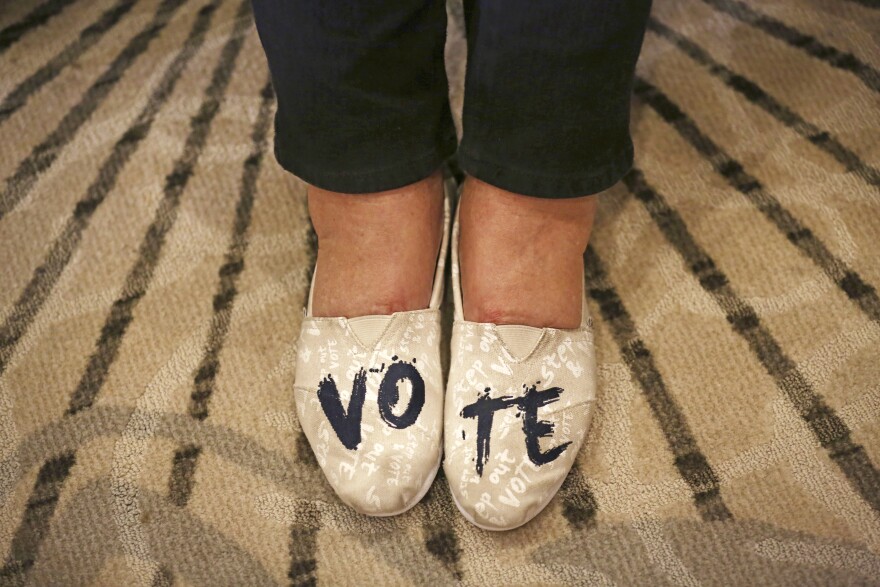The information below is for the May 2019 municipal elections. For November 2019 elections, click here.
If you're registered and have a valid form of ID, you're ready to vote Saturday in the statewide municipal elections. Here's everything you need to know to vote in North Texas.
RELATED
• The Race For Dallas Mayor: 9 Hopefuls, But No Frontrunner, Headed For May 4 Election
• Here Are The Issues The Candidates For Dallas Mayor Are Talking About
• Fort Worth Mayor's Race Pits A Steady Hand Against A Promise Of New Blood
First, if you can't recall whether or not you're registered to vote, check right here. Then, find voting times and locations below.
(Update: Now that the May 4 election is over, if you're looking for election results, head over here.)
What's on the ballot
In Dallas, Mayor Mike Rawlings is term-limited, and nine people are running to replace him. Their campaigns have raised more than $4 million so far. A runoff appears likely. Also on the Dallas ballot: 14 City Council seats are up for grabs.
Fort Worth voters will also elect a mayor. Incumbent Betsy Price faces three challengers — Deborah Peoples, James McBride and write-in candidate Mike Haynes.

Voters in Arlington and several other North Texas cities will also elect mayors.
Across North Texas, Dallas ISD and several other school districts are holding school board elections. In Fort Worth ISD, four of nine school board seats are on the ballot. In Collin County, Frisco, Allen, McKinney and Plano school districts are among those holding elections.
Prosper ISD is asking voters to approve borrowing $1.3 billion for the fast-growing school district that serves parts of Collin and Denton counties.
In Dallas County, voters will vote on $1.1 billion in bonds for community college district improvements.
The city of Garland has a $420 million bond election -- eight bond measures would pay for city facilities and infrastructure.
The Dallas Morning News has a voter guide. Learn more about the Fort Worth and Arlington races here from the Fort Worth Star-Telegram. Here's Community Impact's coverage of various Collin County elections. Here's the Denton Record-Chronicle's coverage of various Denton County elections.
Here's a listing of races in Dallas County (and a Dallas County sample ballot), Collin County, Denton County and Tarrant County.
Where to go and when
- 7 a.m. to 7 p.m.
- Use this polling location finder with a map view, or check out this list view of locations.
- 7 a.m. to 7 p.m.
- Find a polling location here, or view a list of the locations with addresses.
- 7 a.m. to 7 p.m.
- Find a place to vote from this list of polling locations (toward the bottom of the page.)
- 7 a.m. to 7 p.m.
- Type in your address here to find a polling location.
» MORE NORTH TEXAS COUNTIES
Get voting information at the following county websites:
What to bring to the polls

One of seven forms of IDs will get you into a voting booth.
- Texas drivers license
- Texas election identification certificate (EIC) issued by the Department of Public Safety
- Texas personal ID card issued by DPS
- Texas handgun license issued by DPS
- U.S. military ID card containing your photograph
- U.S. citizenship certificate containing your photograph
- U.S. passport, book or card
» What if your ID is expired?
That's ok, to a degree.
- For voters age 18-69: Except for the U.S. citizenship certificate, which doesn't expire, the ID you bring to the polls must have expired no more than four years before.
- For voters 70 and older: You can use one of the seven forms of ID to vote, regardless of how long it's been expired, as long as it's otherwise valid.
» What if you don't have one of the seven acceptable forms of voter ID?
The state lists other forms of identification, like a utility bill or birth certificate, that you can use to vote if you don't "possess an acceptable form of photo identification, and cannot reasonably obtain one."
In addition to presenting that secondary form of ID, you'll also need to fill out a "Reasonable Impediment Declaration" form.
» What if you're a voter with special needs?
Remember that a person of your choosing or an election worker can assist you at the polls. The exception is your employer or someone who represents your employer, or an officer or representative of your union — you cannot ask them to help you vote.
If you're physically unable to enter the polling location, you can even vote curbside. Send somone into the polling location to request an election worker meet you at the curb. If you're planning on arriving alone, call ahead to your county's elections office.
KERA's Stella M. Chávez contributed to this report.
This report has been updated since its original publication on April 22, 2019.










